|
|
|
Sort Order |
|
|
|
Items / Page
|
|
|
|
|
|
|
| Srl | Item |
| 1 |
ID:
110128
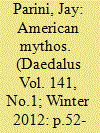

|
|
|
|
|
| Publication |
2012.
|
| Summary/Abstract |
This essay examines the notion of an American narrative, looking at a variety of myths that have been prominent and that have, in various ways, shaped the concept of a nation devoted to Enlightenment and Anglo-Saxon ideals. These include liberty, equality, and justice, which can be traced to thinkers such as Montesquieu, as well as ideals laid out in the Magna Carta. These lofty ideals took the place of more traditional narratives and tribal alliances, and they helped establish a nation that had been formed by so many different immigrant strands. That these stories - going back to the Puritans landing on Plymouth Rock, for example - have been influential seems beyond question. Yet it remains difficult to assess their broader value in determining the course of a nation. How might these founding myths prove useful in refashioning the American stories in ways that, in the future, could be productive?
|
|
|
|
|
|
|
|
|
|
|
|
|
|
|
|
| 2 |
ID:
084665
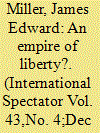

|
|
|
| 3 |
ID:
069782
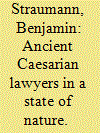

|
|
|
| 4 |
ID:
131895
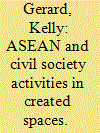

|
|
|
|
|
| Publication |
2014.
|
| Summary/Abstract |
The Association of Southeast Asian Nations (ASEAN) has recently made numerous commitments to engage civil society organizations (CSOs) in its governance practices. However, the opportunities created offer limited means for CSOs to contest policy as a result of strict controls over who can participate and the forms of participation permitted. Activists have consequently pursued their agendas outside of spaces sanctioned by ASEAN through 'created spaces,' such as conferences organized parallel to official summits. However, this form of political participation has limited potential to influence official processes because despite its independence, these activities are still structured in relation to ASEAN practices. The ineffectual nature of CSO advocacy despite ASEAN's people-orientated shift has been documented, however explanations for this trend remain limited. This article applies the modes of political participation framework that acknowledges the role of intergovernmental organizations in structuring spaces for civil society participation and, in doing so, shaping the contribution that CSOs can make. Through an examination of the regulations and practices that govern CSO participation in both ASEAN-sanctioned and independent spaces, it argues that spaces for CSO participation are structured to prevent CSOs from contesting policy, suggesting that ASEAN's shift to widen participation is directed towards legitimating its reform agenda. Hence, ASEAN's claim of becoming 'people oriented' must be considered in recognition of the limiting effect its engagement practices have on CSOs' ability to advance alternative agendas.
|
|
|
|
|
|
|
|
|
|
|
|
|
|
|
|
| 5 |
ID:
121133
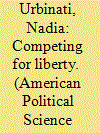

|
|
|
|
|
| Publication |
2012.
|
| Summary/Abstract |
Freedom as non-domination has acquired a leading status in political science. As a consequence of its success, neo-roman republicanism also has achieved great prominence as the political tradition that delivered it. Yet despite the fact that liberty in the Roman mode was forged not only in direct confrontation with monarchy but against democracy as well, the relationship of republicanism to democracy is the great absentee in the contemporary debate on non-domination. This article brings that relationship back into view in both historical and conceptual terms. It illustrates the misrepresentations of democracy in the Roman tradition and shows how these undergirded the theory of liberty as non-domination as a counter to political equality as a claim to taking part in imperium. In so doing it brings to the fore the "liberty side" of democratic citizenship as the equal rights of all citizens to exercise their political rights, in direct or indirect form.
|
|
|
|
|
|
|
|
|
|
|
|
|
|
|
|
| 6 |
ID:
076056
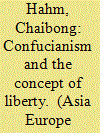

|
|
|
| 7 |
ID:
106675


|
|
|
|
|
| Publication |
2011.
|
| Summary/Abstract |
The amazing scenes that were beamed from Cairo's Tahrir Square in January and February 2011 conveyed an important revelation about the ingenuity and resourcefulness of the human spirit. In particular, they highlighted the miraculous power of joint public action not only to carve out spaces for freedom, but to forge a new shared identity which is indispensable for the establishment of a durable democratic order. No less significant, however, is that revolutionary action by pro-democracy insurgents has provided concrete answers to many puzzles that had exercised democracy theorists and Middle East experts for decades. By showing how such action can overcome the divisions and obstacles theorists have seen as an impediment to democratisation, the preoccupation with 'prerequisites' for democracy has been revealed as a diversion. From the American Revolution to Tahrir Square, pro-democracy revolutionary action has the power not just to overthrow tyranny, but also to refashion the nation, starting with the revolutionaries themselves. It can also 'overthrow' theory.
|
|
|
|
|
|
|
|
|
|
|
|
|
|
|
|
| 8 |
ID:
148848
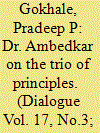

|
|
|
| 9 |
ID:
121043
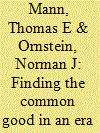

|
|
|
|
|
| Publication |
2013.
|
| Summary/Abstract |
The framers designed a constitutional system in which the government would play a vigorous role in securing the liberty and well-being of a large and diverse population. They built a political system around a number of key elements, including debate and deliberation, divided powers competing with one another, regular order in the legislative process, and avenues to limit and punish corruption. America in recent years has struggled to adhere to each of these principles, leading to a crisis of governability and legitimacy. The roots of this problem are twofold. The first is a serious mismatch between our political parties, which have become as polarized and vehemently adversarial as parliamentary parties, and a separation-of-powers governing system that makes it extremely difficult for majorities to act. The second is the asymmetric character of the polarization. The Republican Party has become a radical insurgency - ideologically extreme, scornful of facts and compromise, and dismissive of the legitimacy of its political opposition. Securing the common good in the face of these developments will require structural changes but also an informed and strategically focused citizenry.
|
|
|
|
|
|
|
|
|
|
|
|
|
|
|
|
| 10 |
ID:
085260


|
|
|
|
|
| Publication |
2008.
|
| Summary/Abstract |
The war on terror has triggered intense about the role of security and liberty, the trade - off between security and liberty, the meaning of security and the power of civil liberty.
|
|
|
|
|
|
|
|
|
|
|
|
|
|
|
|
| 11 |
ID:
099886
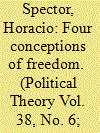

|
|
|
|
|
| Publication |
2010.
|
| Summary/Abstract |
Contemporary political philosophers discuss the idea of freedom in terms of two distinctions: Berlin's famous distinction between negative and positive liberty, and Skinner and Pettit's divide between liberal and republican liberty. In this essay I proceed to recast the debate by showing that there are two strands in liberalism, Hobbesian and Lockean, and that the latter inherited its conception of civil liberty from republican thought. I also argue that the contemporary debate on freedom lacks a perspicuous account of the various conceptions of freedom, mainly because it leaves aside the classic contrast between natural liberty and civil liberty. Once we consider both the negative/positive distinction and the natural/civil one, we can classify all conceptions of freedom within four basic irreducible categories. In light of the resulting framework I show that there are two distinct conceptions of republican liberty, natural and civil, and that the former is coupled with an ideal of individual self-control.
|
|
|
|
|
|
|
|
|
|
|
|
|
|
|
|
| 12 |
ID:
190505
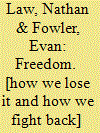

|
|
|
|
|
| Publication |
London, Bantam Press, 2021.
|
| Description |
xvi, 221p.pbk
|
| Standard Number |
9781787635432
|
|
|
|
|
|
|
|
|
|
|
|
Copies: C:1/I:1,R:0,Q:0
Circulation
| Accession# | Call# | Current Location | Status | Policy | Location | IssuedTo | DueOn |
| 060373 | 323.44/LAW 060373 | Main | Issued | General | | RF020 | 31-May-2024 |
|
|
|
|
| 13 |
ID:
169349


|
|
|
|
|
| Summary/Abstract |
The extreme conditions of all extraterrestrial environments restrict freedom of movement and encourage social, political and economic arrangements friendly to tyranny. However, deliberately engineered measures might be taken to maximise liberty in the space environment. For example, space settlements can be engineered to maximise the number of oxygen, food, water and power systems to disallow coercive regimes the opportunity to control single machines on which entire settlements depend. Spacesuits can be engineered to be easily manufactured and maintained, thus maximising the number available to occupants of a settlement and minimising the extent to which bespoke and difficult-to-service suits restrict freedom of movement. Other examples of this approach to engineering are provided, which we might term ‘freedom engineering’. Although attempts to deliberately engineer freedom into a settlement turn on the definition of ‘freedom’, it is suggested that objective criteria in the enhancement of certain types of individual and collective liberty can be used to determine when an act of freedom engineering is likely to be beneficial for a settlement. The space policy implications of these ideas are discussed.
|
|
|
|
|
|
|
|
|
|
|
|
|
|
|
|
| 14 |
ID:
051126
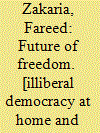

|
|
|
|
|
| Publication |
New Delhi, Viking, 2003.
|
| Description |
286p.
|
| Standard Number |
067004993
|
|
|
|
|
|
|
|
|
|
|
|
Copies: C:1/I:0,R:0,Q:0
Circulation
| Accession# | Call# | Current Location | Status | Policy | Location |
| 046740 | 321.8/ZAK 046740 | Main | On Shelf | General | |
|
|
|
|
| 15 |
ID:
041887
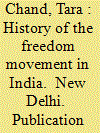

|
|
|
|
|
| Publication |
New Delhi, Publication Division,Ministry of Information and broadcasting, 1972.
|
| Description |
vi, 527p.hbk
|
| Contents |
Vol. III
|
|
|
|
|
|
|
|
|
|
|
|
Copies: C:1/I:0,R:0,Q:0
Circulation
| Accession# | Call# | Current Location | Status | Policy | Location |
| 011623 | 954.03/CHA 011623 | Main | On Shelf | General | |
|
|
|
|
| 16 |
ID:
101843
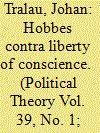

|
|
|
|
|
| Publication |
2011.
|
| Summary/Abstract |
It has often been argued that, notwithstanding his commitment to the authoritarian state, Thomas Hobbes is a champion of the "minimal" version of liberty of conscience: namely, the freedom of citizens to think whatever they like as long as they obey the law. Such an interpretation renders Hobbes's philosophy more palatable to contemporary society. Yet the claim is incorrect. Alongside his notion of "private" conscience, namely, Hobbes develops a conception of conscience as a public phenomenon. In the following, it is argued that this inconsistency serves the purpose of deception: it holds out the possibility of dissent while making it impossible to utilise. Arguably, moreover, this is the proper hermeneutical approach to take to Hobbes's inconsistencies in general. Indeed, said inconsistencies ought to alert contemporary normative theorists to the instability of the "minimal" version of liberty of conscience attributed to Hobbes: Hobbes himself, namely, shows that it is insufficient.
|
|
|
|
|
|
|
|
|
|
|
|
|
|
|
|
| 17 |
ID:
111648
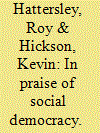

|
|
|
|
|
| Publication |
2012.
|
| Summary/Abstract |
This article makes the case for social democracy in the context of difficult national and international economic conditions and changes in domestic politics that see a Conservative-dominated Coalition government and the Labour party in Opposition for the first time since 1997. It rejects much current thinking in the Labour party and instead argues that traditional social democratic values, such as equality and social justice, are of contemporary relevance and can only be achieved through a strong central state committed to those values.
|
|
|
|
|
|
|
|
|
|
|
|
|
|
|
|
| 18 |
ID:
105170
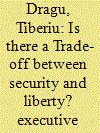

|
|
|
|
|
| Publication |
2011.
|
| Summary/Abstract |
I develop a game-theoretic model of an interaction between an antiterrorist agency and a terrorist organization to analyze how the probability of a terrorist attack varies when the level of privacy protections changes. I derive two implications. First, privacy and security from terrorism need not be in conflict: when accounting for strategic interactions, reducing privacy protections does not necessarily increase security from terrorism. Second, and more important, the antiterrorist agency will always want less privacy. The very agency whose expertise affords it disproportionate influence on policy making will prefer a reduction in privacy protections even when that reduction harms security from terrorism. The analysis has implications for understanding the relationship between government powers and civil liberties in the context of terrorism prevention and times of emergencies more generally.
|
|
|
|
|
|
|
|
|
|
|
|
|
|
|
|
| 19 |
ID:
051164
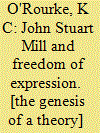

|
|
|
|
|
| Publication |
London, Routledge, 2001.
|
| Description |
viii, 226p.
|
| Standard Number |
0415253047
|
|
|
|
|
|
|
|
|
|
|
|
Copies: C:1/I:0,R:0,Q:0
Circulation
| Accession# | Call# | Current Location | Status | Policy | Location |
| 048213 | 323.44/ORO 048213 | Main | On Shelf | General | |
|
|
|
|
| 20 |
ID:
102906
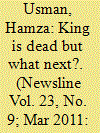

|
|
|
|
|
|
|
|